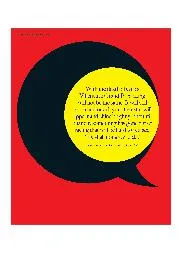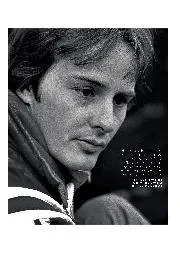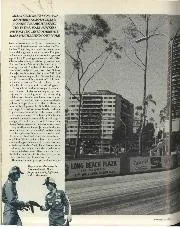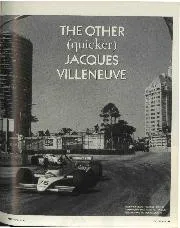“He’s pretty sharp in working out where he wants to be at any given time in his career and he doesn’t want to run before he can walk.” So will he get faster then? “Towards the end of this season and certainly at Estoril I think he’s started to realise that he can actually run a bit faster than he thought he could. That manoeuvre round the outside of Schumacher was just the first glimpse of some of his confidence which I think will come through next year. Estoril is the circuit that he knows the best he’s done 3,000 kilometres round there so he was in a position where he had absolute confidence in what the car was going to do and was quite happy to take chances other drivers weren’t. Next year, when he knows all the tracks. you’ll see that much more often.
That dramatic overtaking of The World’s Fastest Driver’ at Estoril was part opportunism (Lavaggi had compromised Schumacher’s entry into the corner) and partly the result of weeks of planning. The latter lends some credence to Stewart’s point of view.
One of his biggest strengths is that he thinks about a lot more aspects of racing than any driver I’ve come across,” adds Clear. “He thinks about all sorts of weird what-ifs, he’ll talk over possible pace car situations, for example, all the time and 99% of the time they don’t come to be, but sometimes they do and when they do he’s ready. We’d talked about setting the car up for that corner onto the straight at Estoril for two weeks. He’d said ‘I want to be able to pass people round the outside there’. We’d agreed how to set the car up that way and because he’d already gone through the scenario, when the moment came he didn’t even have to think about it.”

Jacques found early success in Indycars, winning the ’95 Indy 500 and series title
In that move, he did something to Schumacher that Hill has been unable to manage in four seasons of wheel-to-wheel racing with the German, make a genuine passing manoeuvre that stuck. In fact, there are other indications that his approach is closer to Schumacher’s than to his team-mate’s, such as the way in which he sets a car up.
Clear: “Jacques’ preference is to run the car a lot stiffer than Damon. When Damon and JeanChristophe (Bouillon, the Williams test driver) have tried Jacques settings, they’ve found it virtually undriveable. When Jacques tries a Damon set-up it’s less critical, but there tends to be too much understeer for him, it’s less responsive. We don’t really know what Michael used to do at Benetton in absolute terms, but we all know that if you talk to Herbert, Verstappen or Berger, the Schumacher set-ups are supposed to be undriveable and swap ends too quickly.
“These sort of comments tie in more with Jacques, and this was part of my and Jacques’ arguments for persevering with this route at the end of the day, if you ended up with a car similar in set-up to Michael’s you wouldn’t be so alarmed. It can be made to work.”








